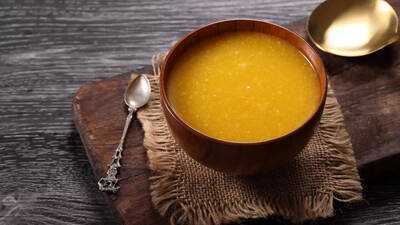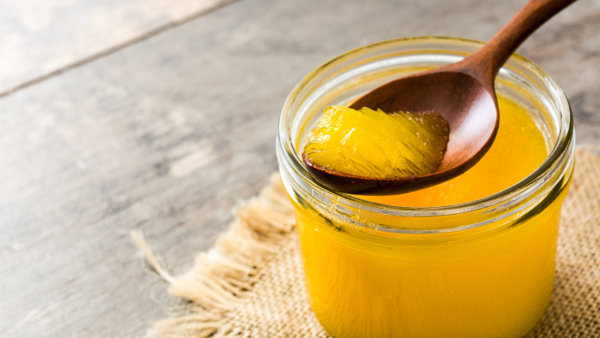
How you start your day can define your health conditions, while most people in India begin their morning with a warm cuppa of tea, which may seem like the most rejuvenating way to start the morning, but it gradually causes bloating and a spike in sugar levels. Interestingly, in ancient India and traditional philosophy of medicine like Ayurveda, the concept of tea or caffeine laden drinks was missing, and yes it was for a reason. Here’s a scoop from the most revered Ayurvedic remedies to start the day! Read on to find out…
 Why Ghee?
Why Ghee?
Ghee in Ayurveda is that one ingredient that has the power to balance all three doshas such as Vata, Pitta, and Kapha, this is because of its unique qualities of being sweet, cooling, and unctuous. Known for its healing properties, ghee is considered a ‘Sneha Dravya’ (oleaginous substance) in Ayurveda as it nourishes and lubricates the tissues (Dhatus), supports digestive fire (Agni), and boosts Ojas, which is the primary essence of vitality and immunity. According the books of Ayurveda, beginning the day with ghee may help in boosting digestion, improving nutrient absorption, especially for fat-soluble vitamins, support mental clarity, and strengthen the body's resilience against diseases. Moreover, ghee also acts as a potent carrier for herbal medicines in Ayurveda, enabling deep nourishment and detoxification. This daily practice helps in striking the perfect balance of body and mind, which is great for good health, longevity, radiant skin, and overall well-being making it a foundational element in Ayurvedic health and lifestyle.
What happens when you drink ghee water?
Starting the day with one teaspoon of ghee in warm water is an ancient Ayurvedic practice, which is known for its multiple health benefits. Ghee is basically clarified butter, which is rich in medium-chain fatty acids, antioxidants, and fat-soluble vitamins like A, D, E, and K; When consumed with warm water it acts as a lubricant for the digestive system. This can promote smooth digestion, reduce bloating, and prepare the digestive tract to efficiently process food throughout the day. It is also thought to stimulate metabolism, help in weight management by curbing unnecessary hunger pangs, and support joint lubrication and flexibility. What’s more, the antioxidants and nutrients in ghee may enhance immune function and nourish the skin by giving a natural glow.
But is it for everyone?
There’s no denying that ghee is the most potent ingredient, which is extensively used in cooking, home remedies and even in Ayurvedic medicines, but one thing that can not be ruled out about this healthy fat is its fat content, which calls for moderation and may not be great for people with LDL Cholesterol, Diabetes and other underlying health issues.
Why do diabetics and people with high cholesterol must exercise control?
Consuming one teaspoon of ghee daily is generally considered safe and does not raise cholesterol levels, if overall diet and lifestyle are balanced. However, high-quality ghee made from A2 cow milk has been suggested to improve good HDL cholesterol and may help reduce bad LDL cholesterol. However, people with existing high cholesterol or diabetes should monitor their ghee intake carefully as an excess of ghee may have adverse affect on health. This is majorly due to its saturated fat content, which may lead to weight gain, increase cholesterol, or worsen the glycemic index. Apart from that, individuals with digestive sensitivities such as acidity or bloating or IBS, must start with lower amounts of ghee and observe the body's response and it is best to seek medical guidance before starting something new.
What studies say?
According to a study published in the on The effect of ghee (clarified butter) on serum lipid levels it was found that ghee may help improve cholesterol profiles by increasing HDL (good cholesterol) and reducing LDL (bad cholesterol), thereby supporting heart health. Studies in traditional and modern contexts show ghee can aid digestion, boost metabolism, and support mental function, including memory and cognitive health. In fact, ghee’s conjugated linoleic acid (CLA) has been linked to fat loss, particularly reducing abdominal fat. Research also indicates ghee may have anti-inflammatory effects beneficial for joint and bone health. As per the preliminary clinical study showed that a moderate doses of medicated ghee decreased serum cholesterol, triglycerides, phospholipids, and cholesterol esters in psoriasis patients. A study on a rural population in India revealed a significantly lower prevalence of coronary heart disease in men who consumed higher amounts of ghee.
-
5 desserts trending in Hyderabad right now and where to try them

-
Dosa to Jalebi: 8 Indian dishes and their similar global cousins

-
Red Fort blast: Cops track down vehicles parked near exploded car; quiz drivers, owners

-
With 1,700 aircraft pending orders, India needs 30,000 pilots: Naidu

-
Rekha at 71: The timeless diva and her simple secrets for glowing skin
